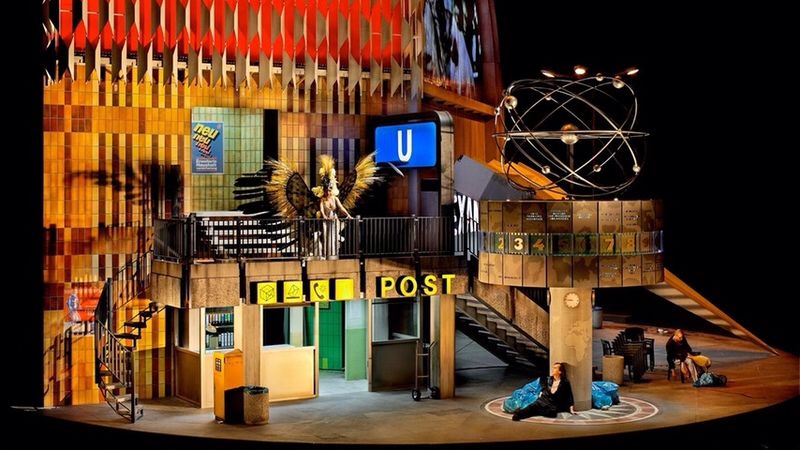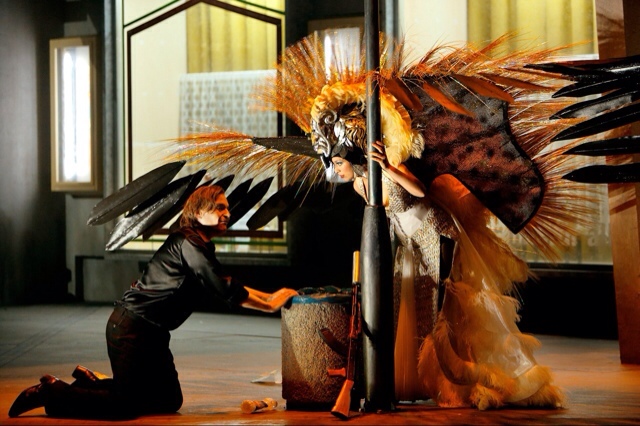
To begin with, the “oil” motif, that is, the idea that petroleum is both practically and metaphorically the equivalent of what “gold” meant in the “legendary” time-setting of Wagner’s libretto, is more or less ignored in this segment of the cycle. It becomes increasingly apparent that this “oil” concept was from the beginning at most a jumping-off point for what Castorf is trying to express. As a fellow journalist remarked to me after the second act, “There is nothing political here at all.”
And, remember, this is in reference to a piece that’s played against a backdrop that alternates between of a parody of Mount Rushmore, with Marx, Lenin, Stain and Mao in place of the U.S. presidents and a hyperrealistic recreation of the Alexanderplatz in Berlin.
Mime has settled here in the mountains in an old Airstream trailer, where smithing is only a sideline, or perhaps only another symptom of obsessive behavior suggesting schizophrenia. He’s constantly poring over old newspapers and books, tearing out articles and squirreling them away. Siegfried is a full-grown jerk in a black silk shirt and gold disco chains, seemingly just returned from night at the Roxbury.
Or maybe it’s a slightly more sinister place even than that, because he’s brought home with him not a bear but a cub, our David Cross clone again, who remains onstage bare-chested, tethered to a rope around his neck, though the whole act. Curiously, it’s Mime who takes charge of Bear, puttting this new slave to work on some kind of incomprehsible task of moving piles of books into the trailer, out of the trailer, from stage right to stage left.
Unfortunately, Bear’s tasks are about all that happens in this act. Siegfried throws things around violently, maybe a bit more violently than he usually does. The Mime-Wanderer scene, which I was particularly looking forward to because it featured Burkhard Ulrich and Wolfgang Koch, the two most exciting actors thus far in the cycle, went for almost nothing.
The forging of Nothung was a confused mess, with Lance Ryan (Siegfried) first putting together the parts of an automatic rifle, then grabbing an already-complete sword from inside the trailer so he’s have something to whack in rhythm. (Oddly, Castorf chose to complicate the notated sword-beating with Mime’s rhythmic vegetable-chopping as he prepared the poisoned soup.)
The act ended with no demonstration at all of how Siegfried’s sword sliced (I thought he might chop off the tip of Stalin’s mustache or something) and not even a clean exit: Ryan ran up some scaffolding stairs stage right only to find they didn’t lead anywhere, and had to shove his way past Mime to try to get off the other way: on all this confusion the first act curtain fell and the boos were loud and long, with almost no applause at all.
I confess I felt like joining in the booing,not because the action was “disrespectful” or even incomprehensible, but rather because it was unfocused and boring. Like a couple of scenes in the Walkure before it, this act looked unfinished, underrehearsed, and worse, as if the director didn’t even come up with a clear idea of what he wanted.
So I went back into the theater in a very grey mood (it didn’t help that it was raining and chilly, and there’s only limited cover from weather around the Festspielhaus, so I was going from being jostled and wet to a packed theater with hard seats, and, oh, well, poor me!) Anyway, I was thinking, well, maybe the negative reviews are right and this is indeed a fiasco. And what’s worse this was my least favorite act of the Ring anyway…
The second act was close to genius. The ideas just poured forth: really provocative stuff like, Fafner isn’t a dragon at all, but just a rich thug with a bleached-blonde mullet and an entourage of shopaholic chippies. So when Siegfried ambushes what is essentially a total stranger in the Alexanderplatz and riddles him with bullets, that’s a real game changer in how “heroism” is defined. (How hard is it not to know fear if you’re heavily armed?) The effect is even creepier because we only glimpse the fight firsthand: mostly we see it on security video footage, all grain and bad angles, as projected on a monitor above the plaza.
Earlier there is Siegfried’s relationship with the Forest Bird, which is here explicitly erotic. She appears, significantly just as he’s musing on what a human woman might be like. Well, not many human women perhaps swan about in a garish Mardi Gras ballgown with a 12-foot wingspan of real feathers, but this one does, a dream of fantastical girliness, the embodiment of just how “other” women are to us guys.

There’s even some humor in the bit when the bird finally speaks to Siegfried. She gathers her plumage and flutters up one flight of stairs to meet him on the landing, but meanwhile, he’s descended another staircase and she has to follow. Finally she signals, “I’m out of breath, just stay still” and delivers the warning about Mime.
Jumping back again, the scene between Alberich and Wotan, which can seem very talky, really was electric in this production. Alberich is pasting up posters and an LED billboard above the stage displays a flattering headshot of him as if in an election ad. The Wanderer makes trouble, splashing the Nibelung with his own paste and generally acting as the agent of “destruction” that ordinarily is embodied by Alberich. I can see why some people found Alberich one of the more sympathetic characters in this Ring: he’s nuts, of course, but no more so than anybody else.
Speaking of nuts, Mime’s poisoning scheme here is played as a symptom of his megalomania: it’s more than obvious what he’s up to even to Siegfried, but what a drama he makes of the whole thing! Again, this is a scene that generally plays badly because it is very long and essentially a repetition of the same joke over and over again. Here, Siegfried just lets Mime talk himself out, knowing all along of the poison (if it even is poison). Finally, disgusted and tired, he shivs the dwarf, stuffs him into a plastic cafe chair, and pours a bag of trash over the body as a sort of symbolic burial.
More and louder booing greeted the end of this act, which varied the standard stage action (the bird tantalizes Siegfried and flutters off to show the way to Brunnhilde) simply by having the hero catch up to her and, well, fuck her right in the Alexanderplatz. That struck me as properly anarchic, but I guess I was in the minority.
The Wanderer is calling Erda out of the blue, and he’s not happy about having to ask for help, and she is definitely of at least two minds about meeting again. The cafe tables in the mostly deserted Alexanderplatz are covered in plastic tarp against rain, but the Wanderer is determined they’ll have their dinner out here. Meanwhile, visible on a video screen above the place, Erda, assisted by the Forest Bird, is trying on wigs and dresses for the impending date. Nadine Weismann, supernaturally leggy, is just astonishing here, catching that sense of a diva’s grim resignation at doing a job that has to be done, even against her better judgment.After another damp intermission came the best scene in the cycle so far and I think a really good example of how to stage a serious, lofty dialogue with wit but without resorting to mere gags. This is the so-called “blowjob” moment for the Wanderer and Erda, though the (attempted) act of oral sex is only a minor aspect of the scene.
Here’s how the scene plays out: the Wanderer reveals that Brunnhilde has been sentenced to magic sleep, and that just about destroys Erda: she’s bewildered and hurt and bitter all at the same time. With patience (or, eventually, resignation) she listens to the god’s latest harebrained scheme to save the world: something about how this is going to be accomplished through Siegfried and Brunnhilde’s love. Erda, who clearly has some practical experience at just how little love can accomplish, pouts, sulks, builds up a head of steam and eventually dashes a goblet of merlot in Wotan’s face.
Oh, I should mention that “David Cross,” the bear guy, is now playing the waiter, and he’s on this endless loop of delivering bottles of wine and glasses to the table: by the end of a 15-minute scene, it looks like these two have been yammering all night long.
FInally, though, Wotan’s mind goes where it was going all along, i.e., “Hinab!” and he forces Erda to suit the word to the action. She’s sucking on a forefinger and fumbling for his fly when the waiter arrives with the check; Wotan’s strapped so he dashes, offering the singularly lame excuse “Dort seh’ich Siegfried nah’n.”

For a time, animated projections of the two singers’ faces were superimposed over those of a couple of the celebrated socialists; not sure what that meant but it was chilling. Instead of holding out his spear to be broken by Siegfried’s sword (which he wasn’t carrying anyway) Wotan just left it at the highest peak, passing the baton in effect. But Siegfried tossed it away as carelessly as he’d earlier set the god’s wide-brimmed hat skimming into the abyss. All the Wanderer had to do was take one step back on the landing, out of the light, and he effectively didn’t exist any longer.
More climbing for Ryan (this guy deserves bravos just for the sheer physical energy he puts into this performance) and then he reaches the sleeping Brunnhilde who is not, as a matter of fact, in a barn in Baku but rather hidden under some dingy old tarps next to a pile of fossilized antlers (a curiously sad effect, as if the Valkyrie had been thrown out with the garbage.) Ryan plays the kiss very tenderly and sulks after it seems to have no effect, about his first vulnerable moment all night. Then Catherine Foster gradually sort of unfurls herself from the tarp, as if puzzled by her surroundings.
Meanwhile — this is Castorf, remember — up on the video screen over Mao’s head is some eerie footage in slow motion and black and white of what appears to be an elderly knight riding a horse through a forest, searching. So far as I could tell (and I wasn’t watching the film most of the time during this scene) he finds a sleeping woman, also elderly, who turns out to be dead. Could this perhaps be what Brunnhilde was dreaming as she slept? (Maybe not, as the film continues for some minutes after she is fully awake.)
And here the direction seemed to lose focus again. Ryan and Foster slowly moved around on levels and staircases as through a lighting effect, the set seemed to transform into a fluorescent chalk sketch. The characters slowly ran out of steam until the intro to “Ewig war ich,” at which point they ducked through a crag and emerged on the other side of the revolve at the Alexanderplatz,
Part of the lack of energy here possibly was Foster: she does not seem a physically daring performer, constantly fiddling with her skirts and looking at her feet so the only affect we get from her is worry about falling and spraining an ankle. But the other part I think plays into a theory of Castorf’s related in the program notes. He says (and I paraphrase) that once the climax of a dramatic action is reached, one might as well turn away from it or change the subject, there’s little use belaboring the point.
Well, of course, there is precious little dramatic action in this opera once Brunnhilde wakes; some utterly glorious music, but arguably even that is “belaboring,” extending the moment of highest tension beyond its natural span. So, having accomplished the Great Plan, Siegfried and Brunnhilde sort of lose interest. During one of his solos, she briefly disappears offstage and returns in a wedding dress, but he barely glances up when she returns, so interested is he in the cafe menu.
So they sit, looking about as engaged as people do while they’re waiting for the server to bring them their starters, and they sing this rapturous music. Meanwhile, an enormous crocodile slowly crawls to then along the circular path across the front of the revolve.
Now comes a strange effect. On the stage, the Forest BIrd, who’s now just a girl in a feathery evening dress, arrives to tease the crocodile, pull on its tail and then retreat upstage. At the same time, the surveillance video screen shows an alternate version of the scene in which the crocodile devours her.
For the payoff of the scene, Brunnhilde sings her high C and Siegfried, suddenly energized, runs across the stage to embrace the Forest BIrd. Brunnhilde follows and the two women have a brief face off (a foreshadowing of the next opera?) And in the video, Brunnhilde pulls the BIrd out of the crocodile’s mouth.
No crocodile copulation in this version, but a real wall of boos when the curtain came down.
So why should some scenes play brilliantly, others (like the finale) get the “I’m over it” affect, and yet others end up looking like random blocking? Is it that Castorf finds some of the Ring dramaturgy false (he wouldn’t be the first) and therefore pointless to stage in the same manner as the more honest bits? Is he actually aiming for a messy result?
If so, he’s succeeding.



